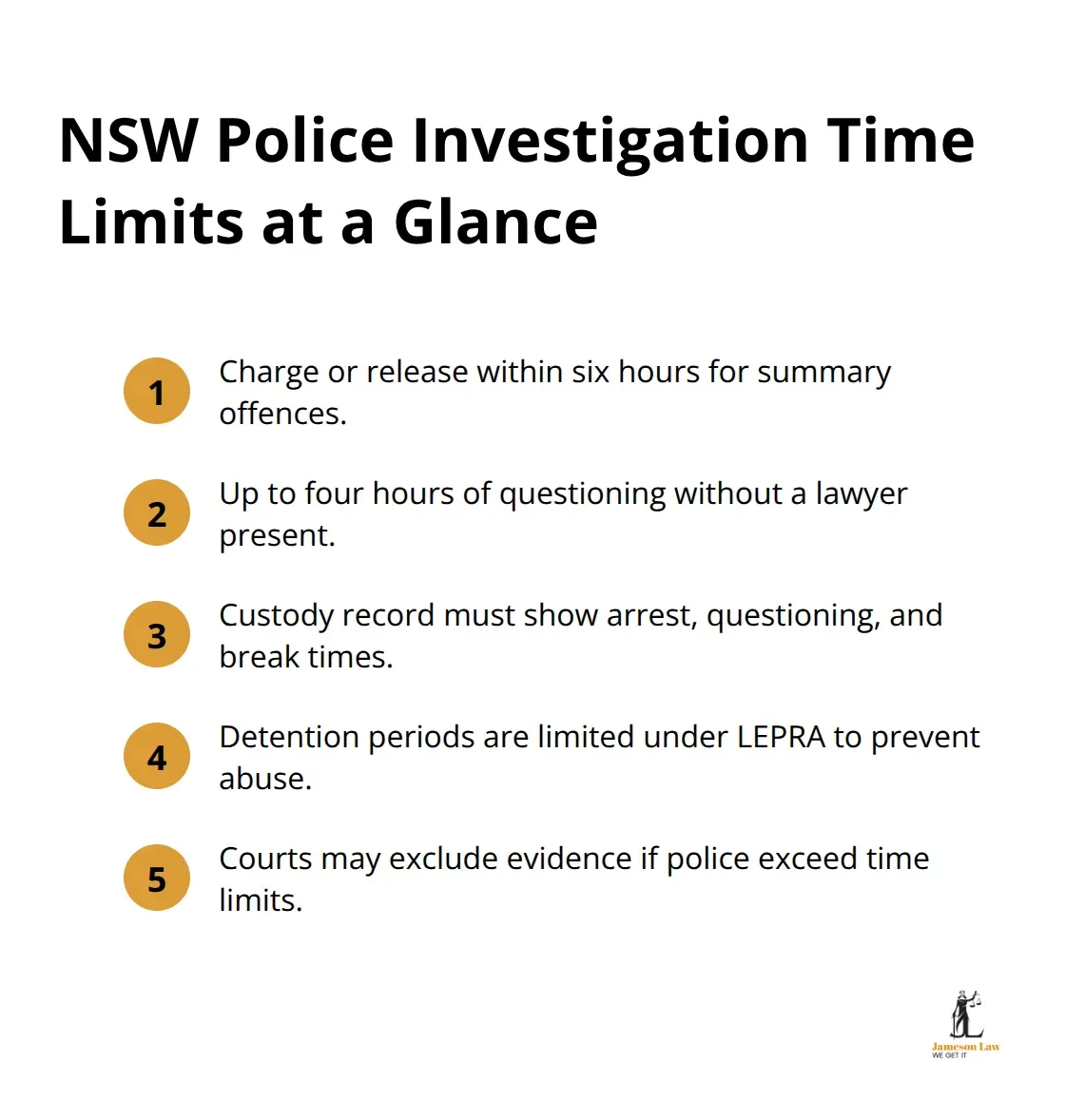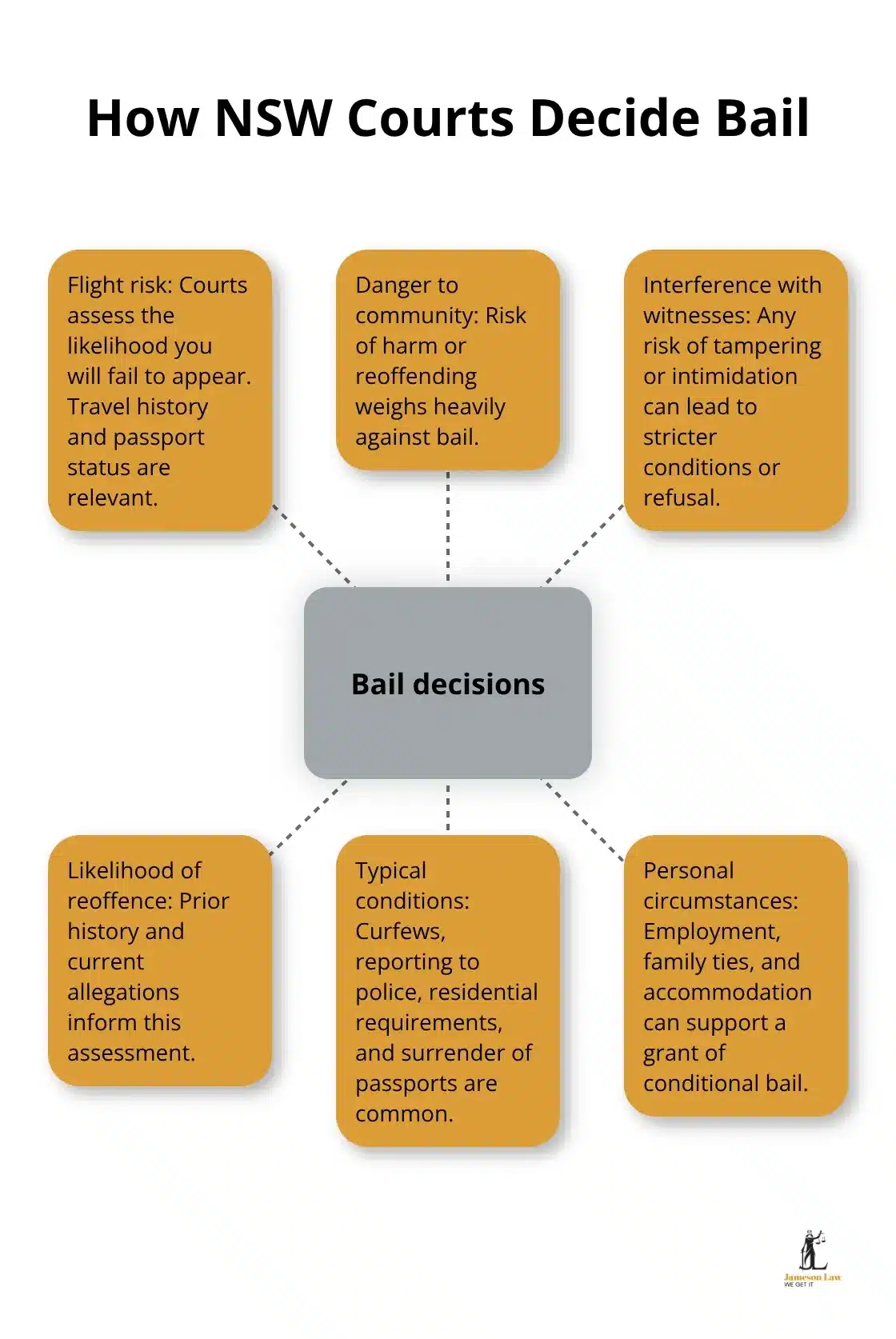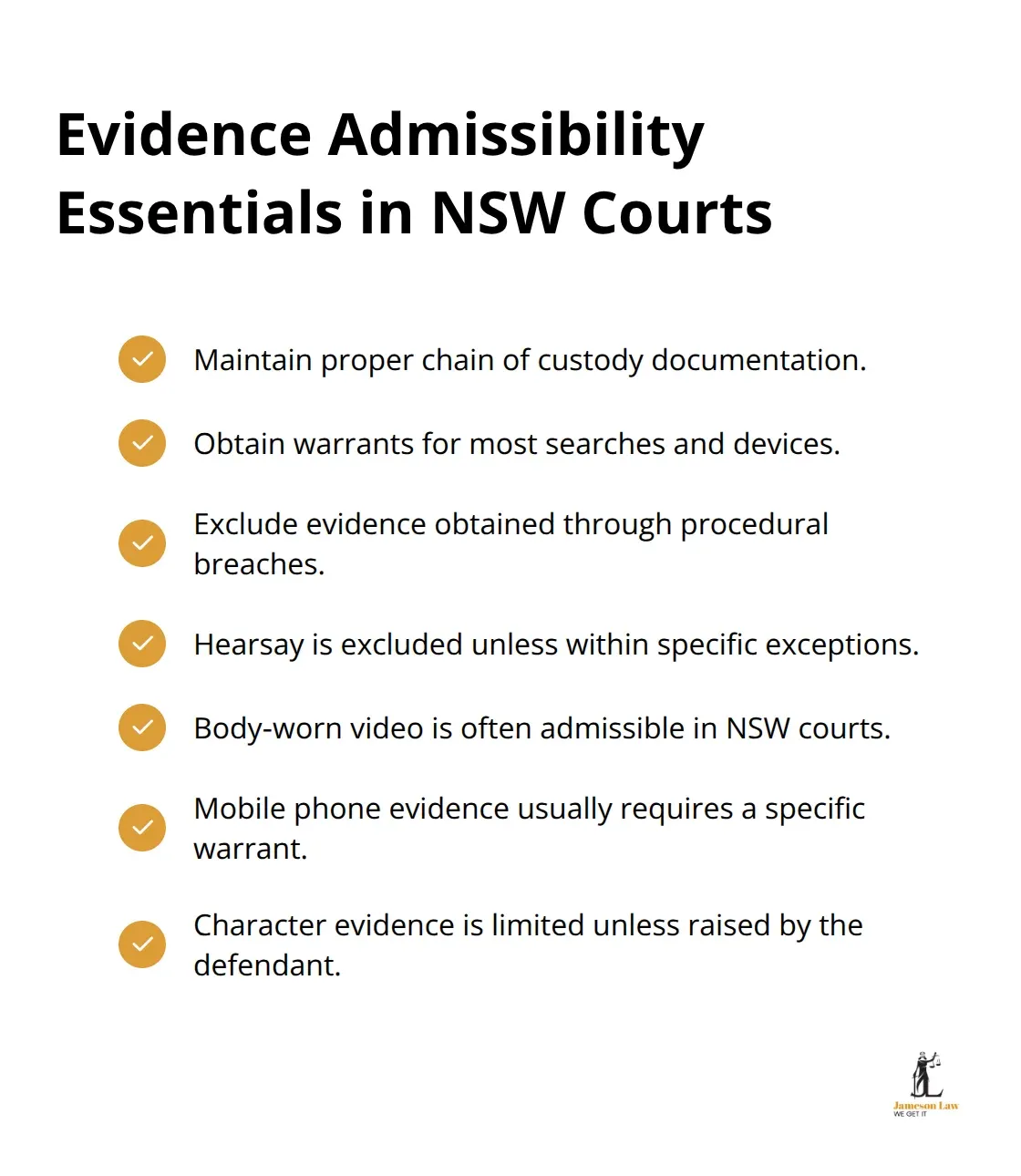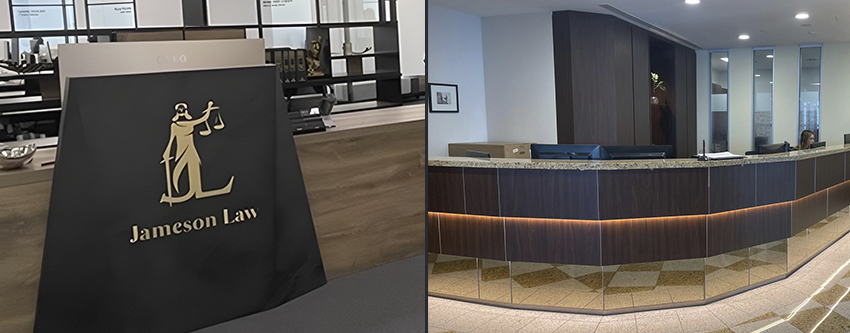Procedural criminal law governs how criminal cases move through the justice system. It sets the rules police must follow during investigations and outlines your rights as an accused person.
Understanding these procedures can make the difference between a fair trial and a compromised defence. We at Jameson Law see how this knowledge protects people facing criminal charges in NSW.
What Makes Procedural Law Different From Substantive Law
Procedural criminal law creates the roadmap for how criminal cases progress through NSW courts, while substantive criminal law defines what actions constitute crimes and their penalties. Procedural law governs police powers during arrests, sets timeframes for court appearances, and establishes evidence rules that prosecutors must follow.
The Criminal Procedure Act 1986 NSW mandates that police must inform you of charges within a reasonable time, while the Evidence Act 1995 determines which evidence courts can accept. These procedural safeguards prevent police from holding suspects indefinitely or using illegally obtained evidence against you.
Police Investigation Timeline Requirements
NSW law requires police to charge or release suspects within six hours for summary offences and up to four hours for questioning without a lawyer present. The Law Enforcement Powers and Responsibilities Act 2002 gives police specific arrest powers but limits detention periods to prevent abuse.
Police must provide you with a custody record that shows exact times of arrest, questioning periods, and meal breaks. Courts regularly exclude evidence when police exceed these time limits, which makes procedural compliance your strongest defence tool.

Court Appearance and Bail Procedures
The Bail Act 2013 NSW requires courts to consider your employment status, family ties, and accommodation when they set bail conditions. Statistics from the NSW Bureau of Crime Statistics show bail status breakdown at first court appearance by bail decision and offence type.
Courts must set hearing dates within 56 days for Local Court matters and 70 days for District Court cases under current case management rules. Police and prosecutors who miss these procedural deadlines often face case dismissals, which gives defendants significant advantages.
Evidence Collection and Admissibility Rules
Police must follow strict procedures when they collect evidence to make it admissible in court. The Evidence Act 1995 requires officers to maintain proper chain of custody documentation and obtain warrants for most searches (except in emergency situations). Courts exclude evidence when police breach these procedural requirements, regardless of how compelling the evidence might be.
These procedural protections become even more important when police exercise their powers of arrest and detention, which form the foundation of any criminal investigation.
Police Powers and Investigation Process
NSW police possess extensive powers during criminal investigations, but these powers come with strict procedural limits that protect your rights. The Law Enforcement Powers and Responsibilities Act 2002 allows police to enter and stay on premises to arrest a person or detain someone under an Act. Police can detain you for questioning, but they must provide specific reasons for your arrest and cannot extend these periods without judicial approval.
Search Powers and Warrant Requirements
Police need warrants for most property searches, but they can search without warrants in specific circumstances. These include when they arrest you, when evidence might be destroyed, or during hot pursuit of suspects. The Crimes Act 1900 NSW gives police power to search your person, vehicle, and immediate surroundings during arrest, but they cannot search your mobile phone without a warrant except in emergency situations. Courts regularly exclude evidence from warrantless searches that exceed these narrow exceptions, which makes warrant compliance a powerful defence strategy.
Your Rights During Police Interviews
You have an absolute right to remain silent during police questioning, and police must inform you of this right before any interview begins. The Evidence Act 1995 sets out the State rules of evidence and applies to proceedings in State courts. Police must electronically record interviews for serious indictable offences, and you can request a lawyer be present during questioning. Police cannot continue questioning after you request legal representation, and any admissions made without proper legal advice often face exclusion in court.
Detention Time Limits and Documentation
Police must charge or release you within specific timeframes and provide proper documentation. They must provide you with a custody record that shows exact times of arrest, questioning periods, and meal breaks. Courts exclude evidence when police exceed these time limits, which gives defendants significant procedural advantages.
These police powers and investigation procedures directly impact what happens when your case moves to court, where bail applications and formal court proceedings begin.
Court Proceedings and Criminal Trial Process
Once your case reaches court, three critical phases determine your outcome: bail decisions, plea negotiations, and evidence presentation. Each phase operates under strict procedural rules that can dramatically impact your case. NSW courts handle significant volumes of criminal matters annually, with most cases resolved through plea negotiations rather than trials.
Bail Applications Shape Your Defence Strategy
Magistrates consider four primary factors when they decide bail: flight risk, danger to community, interference with witnesses, and likelihood of reoffence. The Bail Act 2013 provides a legislative framework for bail decisions regarding persons accused of offences, creating specific procedures for serious offences like armed robbery or drug trafficking. Courts frequently grant conditional bail, typically requiring reports to police stations, residential restrictions, or surrender of passports.

Your employment history, family ties, and accommodation arrangements carry significant weight in bail decisions. Magistrates often impose curfews between 8pm and 6am for assault charges, while drug offences frequently trigger mandatory drug testing conditions.
Plea Negotiations Occur Before Trial
Prosecutors offer plea bargains in most criminal cases because trials consume extensive court resources and create unpredictable outcomes. The Director of Public Prosecutions Guidelines require prosecutors to consider sentence discounts for early guilty pleas, with maximum discounts available when you plead guilty at first court appearance.
Plea negotiations typically involve reduction of charges from indictable to summary offences, dropping of additional charges, or agreement to specific sentence recommendations. Courts must accept or reject plea agreements entirely rather than modify terms, which gives defendants significant leverage during negotiations.
Evidence Rules Control Trial Outcomes
The prosecution must prove guilt beyond reasonable doubt, which courts define as the standard where a reasonable person would not hesitate to rely and act upon the evidence. The Evidence Act nominates unfairness as the test for exclusion of evidence when its admission would be unfair to defendants.
Hearsay evidence faces automatic exclusion unless it falls within specific exceptions like business records or dying declarations. Police body camera footage has high admissibility rates in NSW courts, while mobile phone evidence requires specific warrant procedures that police frequently breach. Character evidence about defendants remains inadmissible unless they introduce evidence about their own good character first.

Final Thoughts
Procedural criminal law knowledge protects your rights throughout every stage of the criminal justice process. Police must follow strict timelines during detention, courts must consider specific factors for bail decisions, and prosecutors must prove guilt beyond reasonable doubt with properly obtained evidence. These procedural safeguards prevent abuse of power and protect innocent people from wrongful conviction.
Professional legal assistance becomes necessary when police question you, when you face serious charges, or when procedural violations occur during your case. Criminal law complexities require expert navigation to identify procedural breaches that could lead to evidence exclusion or case dismissal. Courts regularly exclude evidence when police breach procedural requirements (regardless of how compelling the evidence might be).
We at Jameson Law provide expert criminal defence services across NSW. Our team identifies procedural violations, challenges improperly obtained evidence, and develops defence strategies that protect your rights. We understand how procedural requirements impact case outcomes and use this knowledge to achieve the best possible results for our clients who face criminal charges.













